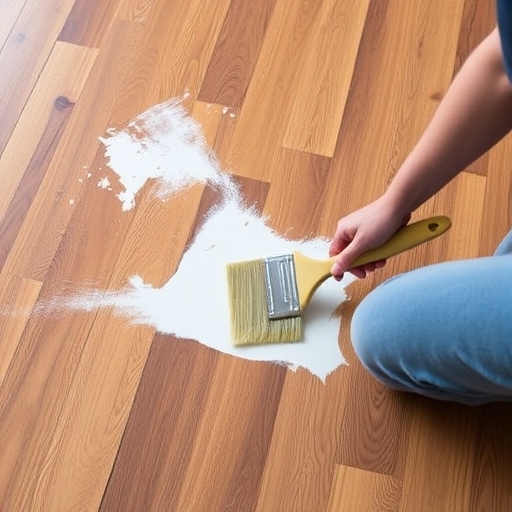How to Get Paint Off Hardwood Floor
Removing paint from hardwood floors can be a daunting task, especially if you’re not sure where to start. Whether it’s due to a DIY project gone wrong or a splatter from a painting job, it’s essential to act quickly and carefully to avoid damaging your beautiful hardwood. In this article, we’ll explore various methods for removing paint from hardwood floors, including tools and tips to help you restore your flooring to its original glory.
Understanding the Types of Paint
Before diving into the removal process, it’s crucial to identify the type of paint you’re dealing with. The two main categories of paint are:
Water-Based Paints
- Characteristics: Easy to clean up with water, quick-drying, and generally less toxic.
- Examples: Latex paints, acrylic paints.
- Characteristics: More durable and resistant to wear, harder to clean up, and longer drying time.
- Examples: Alkyd paints, some varnishes.
- Scraper (plastic or metal)
- Paintbrush or roller
- Soft cloths or rags
- Bucket
- Vacuum cleaner or broom
- For Water-Based Paint: Warm soapy water or vinegar solution.
- For Oil-Based Paint: Mineral spirits, paint thinner, or a commercial paint remover.
- Gloves
- Protective eyewear
- Mask (to avoid inhaling fumes, especially with oil-based paints)
- Move any furniture or obstacles away from the area you will be working on.
- Ensure proper ventilation by opening windows or using fans, especially if you’re working with strong solvents.
- For Water-Based Paint:
- For Oil-Based Paint:
- Act Quickly: The sooner you address the paint spill, the easier it will be to remove.
- Test in an Inconspicuous Area: Always test your chosen method in a hidden spot to ensure it won’t damage the wood.
- Use Gentle Pressure: When scraping, use gentle pressure to avoid scratching the hardwood.
- Stay Patient: Some paint spots may require multiple applications or a bit of time for the solvent to work.
- Use fine-grit sandpaper to gently sand the area.
- Be mindful of the finish on your hardwood floor; you may need to refinish the area afterward.
Oil-Based Paints
Knowing the type of paint will help you choose the most effective removal method.
Tools and Materials You’ll Need
Basic Tools
Cleaning Solutions
Safety Gear
Step-by-Step Guide to Remove Paint from Hardwood Floors
Step 1: Gather Your Materials
Before you start, gather all the necessary tools and materials. Make sure you have a clean workspace and that your floor is free of dust and debris.
Step 2: Test the Paint
Identify the type of paint by testing a small area with your chosen cleaning solution. If the paint begins to soften or dissolve, you have the right solution.
Step 3: Prepare the Area
Step 4: Apply the Cleaning Solution
1. Mix warm water with a few drops of dish soap in a bucket.
2. Soak a cloth in the solution and gently rub the paint spots.
3. Use a scraper to lift off the softened paint.
1. Dampen a cloth with mineral spirits or paint thinner.
2. Apply it to the paint spot and let it sit for a few minutes to soften the paint.
3. Use a scraper to lift off the paint.
Step 5: Clean the Area
After removing the paint, clean the area with a damp cloth to remove any residue from the cleaning solution. Follow up with a dry cloth to absorb excess moisture.
Step 6: Repeat if Necessary
For stubborn spots, you may need to repeat the application of your cleaning solution and scraping process until all paint is removed.
Step 7: Finish Up
Once the paint is completely removed, consider applying a wood conditioner or polish to restore the shine and protect the wood.
Tips for Successfully Removing Paint
Alternative Methods for Paint Removal
If the above methods do not yield satisfactory results, consider these alternative approaches:
Heat Gun
A heat gun can be effective in softening paint, making it easier to scrape off. However, be cautious about the heat level and distance from the wood to avoid scorching.
Sanding
For severe cases, sanding may be necessary:
Commercial Paint Removers
There are several commercial products designed specifically for paint removal. Always follow the manufacturer’s instructions and safety precautions.
Comparison Table of Paint Removal Methods
| Method | Effectiveness | Ease of Use | Safety | Cost |
|---|---|---|---|---|
| Warm Soapy Water | Moderate | Easy | High | Low |
| Mineral Spirits | High | Moderate | Moderate | Moderate |
| Heat Gun | High | Moderate | Low | Moderate |
| Sanding | High | Difficult | Moderate | Low |
| Commercial Removers | High | Easy | Variable | Moderate |
Frequently Asked Questions (FAQ)
Q1: Can I use vinegar to remove paint from hardwood floors?
Yes, vinegar mixed with water can help remove water-based paints. However, it may not be effective for oil-based paints.
Q2: Will removing paint damage my hardwood floors?
If done carefully and with the right tools, paint removal should not damage hardwood floors. Always test in an inconspicuous area first.
Q3: How long does it take for the cleaning solution to work?
This can vary based on the type of paint and the cleaning solution used. Typically, letting the solution sit for a few minutes is sufficient.
Q4: What if the paint is stubborn and won’t come off?
If the paint is particularly stubborn, you may need to repeat the process several times or consider using a heat gun or sanding.
Q5: Should I refinish my hardwood floors after removing paint?
If the finish is damaged during the removal process, refinishing may be necessary to restore the floors to their original appearance.
Conclusion
Removing paint from hardwood floors may seem challenging, but with the right techniques and tools, you can effectively restore your flooring. Whether using gentle solvents, scraping, or even sanding, patience and caution are key. Always remember to prioritize safety by wearing protective gear and ensuring proper ventilation. With these tips and methods, you can successfully remove unwanted paint and keep your hardwood floors looking their best.

